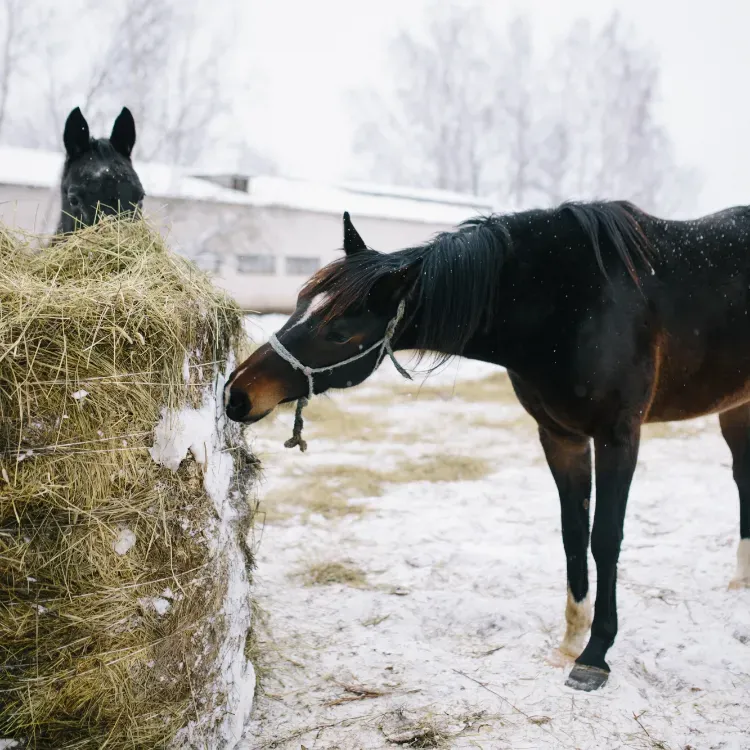
Table of Contents
Introduction
The good news, caring for horses living out in the winter is a good solution for the owner with time and funding issues. Obviously, horses enjoy being in a natural environment, but there are very important horse welfare considerations. So read on and make an informed decision about your horses living out in winter.
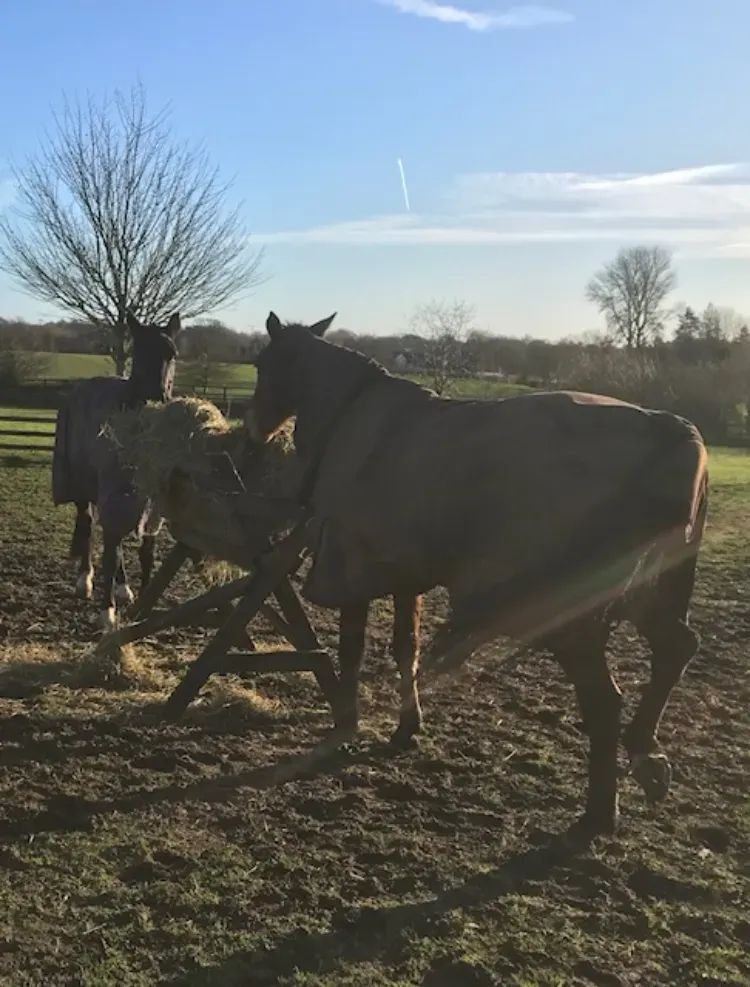
Well Rugged Horses
These well-rugged and well-fed Rideout horses are enjoying the early morning sun.
The Winter Conditions must be Suitable for your Horse
Severe winter weather conditions are not suitable, however, mild winters are not a problem for healthy horses. They will need shelter and adequate additional feeding. In this respect read these three important welfare tips:
1. Clipped horses can not live out and thin-skinned horses with fine winter coats need really thick waterproof rugs.
2. Most horses need a good waterproof rug but hardy horses growing really thick winter coats will not need rugging.
3. Finally, all types of horses need additional feed as the grass will not supply enough for their nutritional needs.
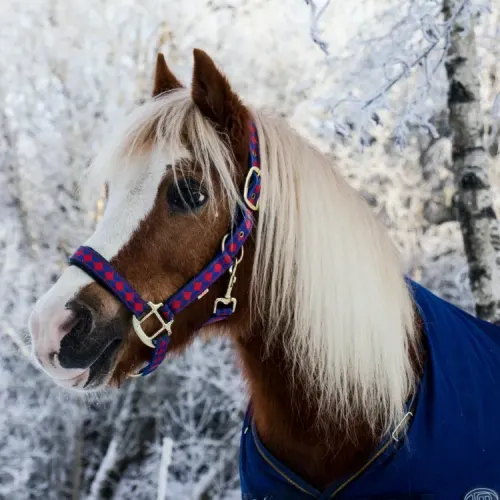
Article Suggestion
The Best Winter Turnout Rug for my HorseThe Amount you must Feed your Horse in Winter
Horses with thin winter coats will need additional feed. This is because keeping warm burns up additional calories, so you must know the type of horses you have. Now read this welfare list about feeding horses living out in winter.
- Hardy horses with really thick winter coats will need additional hay.
- However, most horses will need plenty of hay and some hard feed.
- But some types will need plenty of hay and hard feed both with high feed values.
All horses living out in winter must be good eaters, also old horses do feel the cold, so they will need extra rations.
In Winter, be Careful if your Horse has the Laminitis Gene
Certain really hardy horses that have gained fat throughout the year will need to lose body fat in winter. This will re-program their bodies in readiness for the next year’s rush of good spring grass. If these horses are not managed carefully spring laminitis is on the horizon. However, do remember that it is not good practice to let these horses get fat in the first place. Ideally, they will be kept slim and active throughout the year to avoid problems.
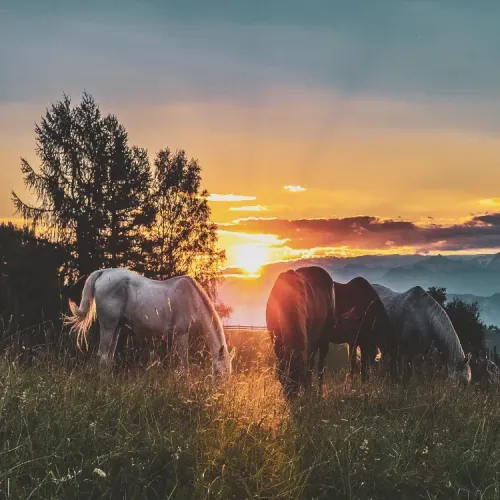
Article Suggestion
All you need to know about Keeping Laminitic Horses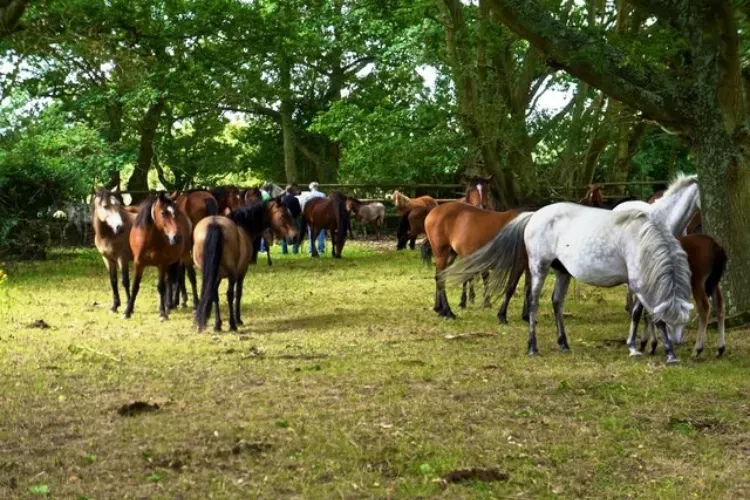
These semi-feral ponies will gradually lose weight over winter in readiness for next year’s spring grass. They will not become too fat in the summer because the grass is not lush and the mare is in foal with a foal at foot.
Important Considerations about Winter Shelter for your Horse
Even in areas where winters are mild do expect days with driving rain, wind, and temperatures below freezing. These conditions are hard on horses and this is why they need shelter. This does not need to be manmade. If your location provides natural shelter from the wind, such as high hedges or adjacent woodland to block the prevailing wind there will be no problem.
Soil Type and Paddock Size must be Correct for your Horse
With a sheltered spot in a location with mild winter conditions, you will be able to winter your stock outside, but you must have enough land and it must remain well drained in winter. Land that becomes waterlogged and/or poached causes horse health and management problems. These problems are outlined here:
- Horses develop mud fever because of a bacterial infection.
- Tendon and ligament damage caused by straining in deep ground.
- Overreaching in deep mud causing damage to the front limbs, through a hind leg hitting a front leg.
- Foot infection associated with white line separation at the sole.
Making 5-Star Wintering Out Conditions for your Horse
Ideally, you will have natural wind protection surrounding your well-drained winter pastures. However, you will not regret constructing a 5-star wintering environment for horses, so work down this list to learn what you will need.
- The pasture will be sectioned off with good post and rail fencing and each section will be big enough for two horses.
- Next, these sections will be individually accessible and each section will have a field shelter facing away from the prevailing wind.
- These will be big enough for two horses and be dividable into two stables.
- Each section will have a permanent supply of water.
- There will be two hay stations per section and these will be placed far enough apart to permit horse movement between the stations without any horse being threatened by another.
- Areas of high footfall will be protected to stop poaching and for this mud mats are ideal.
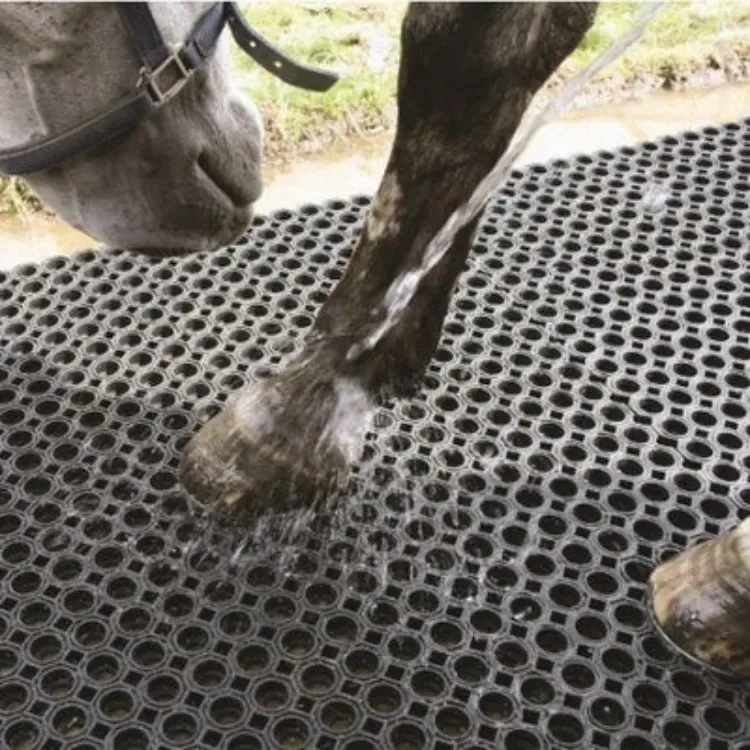
Mud Mats
Mud mats are easily obtained and the best varieties are highly durable and effective.
This 5-star system will be costly to install but will be the best for horses in winter because with two horses per section herd arguments abate. In addition, any horse that has a problem will be effectively stabled and finally, horses are easily checked on a daily basis.
The take-home Message
You have now read the required information and will make your decision about wintering your stock outside. Do not be put off if you do not have a 5-star turn-out system. Wintering horses in a large and sheltered field on well-drained soil is achievable assuming mild winters and you provide daily attention. As a final point, horses living out have health advantages over their stabled cousins. The advantages are given here:
- Horses will have improved hindgut health due to trickle feeding.
- Horses with stomach ulcers will improve.
- All of the stock will have reduced boredom.
- Horses with crib-biting, wind-sucking, and weaving habits will improve.
- Your stock will be constantly moving as nature intended for the species and this improves their soundness and well-being.
So it is a bit of a “no-brainer” as wintering stock outside is frequently a good way to go.
FAQs
Can a Thoroughbred live out in Winter?
Can a clipped horse live out in Winter?
Can an old horse live out in Winter?

